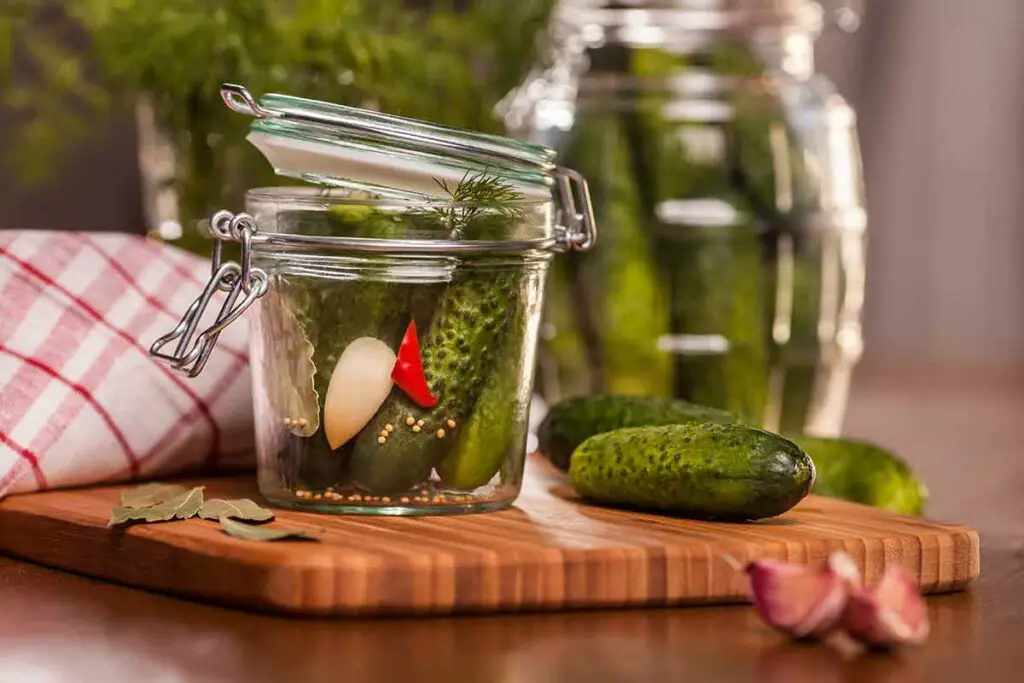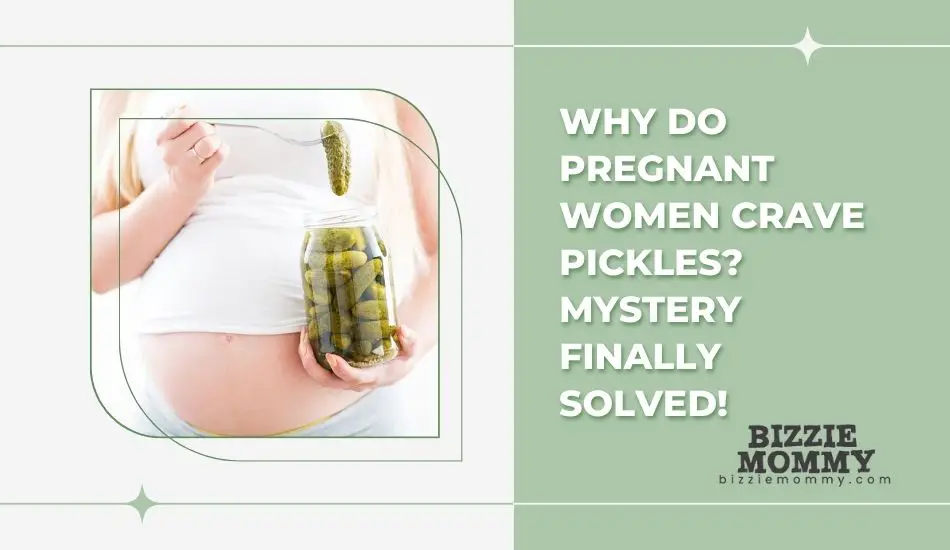Pregnancy cravings are very common and, sometimes, even healthy. Among the most common pregnancy cravings are pickles. Pickle cravings are reported by many women, and a lot of them wonder why pregnant women crave pickles, and this will be answered here.
Numerous factors, like hormones, an enhanced perception of scents, and nutrient imbalances, might be the reason behind pregnancy cravings. For pickles, it is usually said that they indicate low levels of sodium in the body. If not, then the cravings could also be because of Addison’s disease or even dehydration. Additionally, sour and salty foods both have been reported to help with morning sickness and nausea.
Common Reasons for Cravings Pickles
Pickle cravings, generally associated with pregnancy, are actually quite common for many people. Pickles have a distinctive flavor, although salt is largely to blame. As per Healthline, there are about 600 mg of salt in two tiny pickle spears, so eating even a small amount of pickles, whether due to pregnancy cravings or any other reason, would easily fulfill about a quarter of the recommended salt intake, which is 2300 mg. Research suggests a variety of possible causes for cravings in pregnancy.
Hormones
Though there is still little research in this area, the rapidly altering hormone levels that occur during pregnancy might explain cravings.
Nevertheless, it is well established that the first trimester has a considerable rise in estrogen and progesterone, which explains all the morning sickness and nausea. The second trimester, when cravings intensify and morning sickness subsides, is when the majority of pregnant women acclimatize to these elevated hormones. According to one theory, cravings are your body’s way of recovering from an inability to eat and morning sickness.
It is possible for a pregnant woman’s sensory perceptions, particularly of taste and smell, to shift significantly. It’s quite normal if your go-to comfort foods disgust you or if formerly despised foods suddenly taste heavenly. These sensory adaptations are hypothesized to occur to protect you from possibly risky foodstuffs.
Even while there is no evidence that diminished salt sensitivity affects the chemicals that increase salt cravings, salt desires may make behavioral sense since salty foods may be one thing you can readily taste without much effort.
Potentially Current Nutritional Deficiencies
Pickle cravings are a sign that you’re deficient in sodium, according to a more “medical” concept. It’s a common myth that sodium needs to rise when pregnant and that having a pickle craving indicates that your body needs more sodium.
It is undeniable that pregnancy does bring some necessary nutrient changes. For instance, whereas adult women only need 18 mg of iron per day, prenatal growth needs 27 mg. The body needs additional iodine, zinc, folate, and protein. Some have therefore proposed that desires for food are your body’s response to shortages in these crucial elements. However, it has been noted that many pregnant women dislike meals like eggs, meat, and dairy that contain those nutrients.
On the other hand, pickles, frozen yogurt, chocolate, or pizza are apparently the low-nutrient, high-salt, and high-fat foods that people want the most. Therefore, it is unlikely that pickle cravings are brought on by nutritional deficiencies.
Cravings as Seen by the Culture
Cravings during pregnancy could also be influenced by the various cultural perspectives and methods of eating. This happens because culture greatly influences our eating habits. Pregnant women in Japan often report eating rice, although pickles are a common pregnancy craving in North America. It’s possible that hearing about pickle cravings has increased your likelihood of having similar cravings when pregnant.
Health Effects of Eating Pickles While Pregnant
Pickles are among the most commonly craved foods during pregnancy, but they do have negative and positive effects on your health. There are certain health benefits and risks of eating pickles during pregnancy:
Health Benefits
Stop nausea and vomiting and help with morning sickness
Vomiting, as well as morning sickness, are problems that many women have to deal with during pregnancy. Many expectant women claim that eating pickles makes it easier for them to handle these two issues. The foundation of pickles is brine or vinegar. This can aid in pH equilibrium, which helps to combat motion sickness. Morning sickness during pregnancy can be effectively treated with lemon pickles.
Assists in keeping your body’s fluids and electrolytes balanced
Electrolytic equilibrium is essential at specific points in life, including during pregnancy. Numerous pregnancy-related issues can be brought on by electrolytic imbalances. Our bodies’ two primary electrolytes are potassium and sodium. The need for electrolytes rises during pregnancy. One of the best suppliers of electrolytes is reportedly pickles.
Pickles support digestion
Having digestive problems when pregnant is not unusual. Pickles contain beneficial bacteria that keep them from becoming worse. Therefore, consuming pickles in moderation while pregnant may aid in boosting beneficial gut bacteria. This aids in the management of numerous digestive issues.
Pickles do contain certain important nutrients
Vegetables and fresh fruits are used to make pickles. Fruits and vegetables that have been picked still have their nutrients, meaning that they are still good for pregnancy. Pickles are a great source of vitamins; just one dill pickle gives a pregnant woman 15% of the recommended daily intake of vitamin K. This vitamin helps blood coagulate and keeps your bones healthy.
Pickle juice also carries a good quantity of vitamin C, which supports the immune systems and tissue development of babies. However, pickles also have a good amount of salt, so make sure to eat them in moderation. A medium-sized pickle has 325 mg of sodium or 16% of the daily recommended amount.
Risks
Higher chance of dehydration
Pickles raise the risk of dehydration when consumed in large quantities. Pickles contain a lot of salt. The body can become dehydrated if its salt (or sodium) levels are elevated. As a result, it is recommended to consume lots of water to prevent dehydration.
Consuming a lot of water aids in keeping the body’s sodium levels under control by eliminating extra sodium through urine. Both the mother and her baby are seriously harmed by dehydration.
Pickles raise the chance of developing gestational hypertension
If you have gestational hypertension, you should refrain from eating pickles while pregnant. If you are susceptible to or have a history of pregnancy hypertension, remove the pickle from your meal.
Pickles contain a lot of salt, and too much salt causes a spike in blood pressure. Pregnancy-related high blood pressure can result in a number of significant issues and put the entire pregnancy in danger. Pickle eating during pregnancy should be limited to prevent gestational hypertension.
Pickles can cause heartburn
Heartburn is more common in pregnant women. Pregnancy hormones cause the lower esophageal sphincter to loosen. This makes it more likely that bile and stomach acids will reflux into the esophagus. One of the key components of pickles is vinegar. Vinegar contains acid. As a result, many women may have heartburn or acidity as a result of eating pickles while pregnant.
Premature birth can be caused by a high salt intake
The kidneys’ ability to operate can be hampered by an excessive salt diet. This can then result in the fetus receiving insufficient oxygen. Reduced kidney function, as per studies, increases pregnancy problems. It has been discovered that renal problems can up the risk of premature delivery by 52%. Furthermore, it might be ten-fold the likelihood of preterm births occurring before 20 weeks.
Pickles can make sodium levels rise
Extremely high levels of sodium in the mother’s body could be harmful to the fetus’ developmental process and growth. Pickles have a very high salt content. Pickles can significantly raise salt levels if consumed in excess on a regular basis over time.
Ingredients Used in Pickles and Their Effects.

People pickle a wide range of items, from fermented vegetable dishes to the typical brined cucumbers found on burgers. The most popular kind of pickles in the United States are cucumber ones, which can be easily purchased in all supermarkets and many eateries. These salty, tart nibbles are said to have several health advantages. Even though research has verified some of these claims, pickles may have a harmful effect on some individuals.
Pickles generally have vinegar, oil, salt, or spices used for flavor and preservation. All these, when used in moderation, might help the pregnancy, but if taken in excess, they can cause health complications.
Vinegar: Despite the fact that vinegar provides a number of health advantages, specialists and many people advise against direct or excessive ingestion due to its potential negative effects, which include:
- Bone loss and reduced potassium levels.
- Additionally, vinegar can cause tooth enamel damage and heartburn.
- Unpleasant stomach problems.
Oil: According to research, consuming too many omega-6 fats during pregnancy, especially linoleic acid, may promote inflammation in the mother’s body and may raise her risk of developing heart disease.
Salt: The amount of salt you should consume is the same during pregnancy as it would otherwise. A high intake of salt might have a deleterious impact on blood pressure. The kidneys are impacted by salt, which helps the body with water retention. Greater blood volume because the excess fluid can also raise blood pressure. Thus, a low-sodium diet during pregnancy can assist in maintaining blood pressure within a reasonable range and lowering the risk of heart disease, stroke, and other diseases.
Tips for Safety in Consuming Pickles
To enjoy pickles while pregnant, keep the following factors in mind:
- To manage the amount of salt you consume daily, check the labeling on the container for lesser or reduced salt content.
- The nutrition information panel of various products should be compared in order to select one with less salt and sugar. Keep in mind that sweet pickles are made with sugar, while dill pickles aren’t.
- Look for some healthy eating methods if you like to binge eat.
- Additionally, keep an eye out for store-bought pickles made with vinegar, which are normally kept on the shelves at room temperature.
- Observe the label’s storage directions. Depending on the production process, pickles may need to be refrigerated after being opened to prevent them from spoiling.
- Pickles should always be pulled from the jar using a utensil to reduce the possibility of introducing hazardous bacteria.
Related Cravings and Causes
Chocolate
The natural ingredient in chocolate known as tryptophan aids in the production of serotonin in the brain. Serotonin secretes endorphins, which help us feel positivity. To sum it up, chocolate brings us joy.
Lemons
While it may seem unusual, pregnant women usually crave lemons. Lemon water is a popular solution for some women to soothe this craving while staying hydrated.
Soda
Several women drink soda to deal with their morning sickness. Nevertheless, because of its amount of sugar, soda is not a great option for pregnant women, particularly those who suffer from gestational diabetes.
Spicy Food
Due to the sweat that spicy foods make you create, your body will naturally decrease its temperature and relax. This one is brought on by our bodies automatically via cravings, or you can purposefully use this strategy when you simply want to relax.
Dairy Products
Numerous pregnant women frequently crave ice cream and yogurt. This may result from a calcium deficiency or just from having a sweet tooth. You can control these urges with calcium, vitamin D, and calcium-rich items like cheese and milk.
Know That Cravings Are Normal
Cravings during pregnancy are the body’s natural reaction to hormonal changes and might even be important for you to stay healthy. Cravings usually go away by the second or third trimester. Different women have different cravings. Some crave spicy foods, some crave salty foods, and some crave sweet foods like ice cream. Know that food cravings are completely normal during pregnancy. It is merely one of the pleasures of being pregnant.

